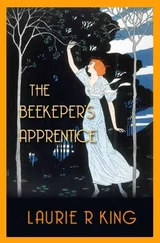J. Janes - Beekeeper
Здесь есть возможность читать онлайн «J. Janes - Beekeeper» весь текст электронной книги совершенно бесплатно (целиком полную версию без сокращений). В некоторых случаях можно слушать аудио, скачать через торрент в формате fb2 и присутствует краткое содержание. Год выпуска: 0101, Издательство: MysteriousPress.com/Open Road, Жанр: Исторический детектив, на английском языке. Описание произведения, (предисловие) а так же отзывы посетителей доступны на портале библиотеки ЛибКат.
- Название:Beekeeper
- Автор:
- Издательство:MysteriousPress.com/Open Road
- Жанр:
- Год:0101
- ISBN:нет данных
- Рейтинг книги:4 / 5. Голосов: 1
-
Избранное:Добавить в избранное
- Отзывы:
-
Ваша оценка:
- 80
- 1
- 2
- 3
- 4
- 5
Beekeeper: краткое содержание, описание и аннотация
Предлагаем к чтению аннотацию, описание, краткое содержание или предисловие (зависит от того, что написал сам автор книги «Beekeeper»). Если вы не нашли необходимую информацию о книге — напишите в комментариях, мы постараемся отыскать её.
Beekeeper — читать онлайн бесплатно полную книгу (весь текст) целиком
Ниже представлен текст книги, разбитый по страницам. Система сохранения места последней прочитанной страницы, позволяет с удобством читать онлайн бесплатно книгу «Beekeeper», без необходимости каждый раз заново искать на чём Вы остановились. Поставьте закладку, и сможете в любой момент перейти на страницу, на которой закончили чтение.
Интервал:
Закладка:
‘The son …’
‘What about the son? Well, come on, damn it, tell me.’
‘F.M.’
Out in the garden, not a sound came up from the city at nearly 5 a.m. Far beyond the Bois de Boulogne, far over England and freedom, a shooting star streaked long and hard and cleanly until snuffed out.
Up from the ground came the terrible dampness and the cold.
‘F.M., Hermann. What, please, have the Honorary Members of the SS to do with this little murder which was not murder at all, simply the attempted variety, if what we have seen of it so far is true.’
‘It could so easily have been a black-market mistake, idiot. How else these days is one to find the smell or taste of bitter almonds?’
Everyone knew there were hazards with black-market products. No questions were ever asked. To complain was to get nothing further and to have one’s name passed on to other traffickers. ‘Well, what about the F.M., Hermann? Please don’t spare me.’
In 1932 there had only been about 13,000 Honorary Members, recalled St-Cyr. Collectively they had contributed a modest 17,000 marks to the SS’s ‘cultural, charitable and social pursuits’. But in 1934 membership had grown to over 342,000, with an increase in funds of nearly 600,000 marks. Since then he had lost track, but the sky must be the limit.
‘ Jeder an seiner Stelle , Louis,’ said Kohler. ‘ Es ist eine Ehre, förderndes Mitglied zu zein .’
Each in his appointed place, translated St-Cyr. It is an honour to be an honorary member. By caving in and joining the F.M., not the SS or the Party, one made a little contribution every year, thereby avoiding the strong-arm boys and the constant squeeze. Guaranteed a little peace, the Honorary Members and another, similar group, the Friends of the Reichsführer-SS, got on with their business interests — shoes, beer, tanks, cigars or whatever. All were involved.
‘Siemens-Schuckert, Hermann. I.G. Farben. The Krupps, the Norddentsche Lloyd and Hamburg-America Shipping Lines, the Dresdner and Deutsche banks — all of the really big companies sent board members to join the Friends, and often the F.M., and in doing so, dragged in the little fish.’
‘Himmler still has a good thing going with them, Louis. That little badge I saw only proves it. Silver no less, not zinc’ As were many of the medals these days.
‘And the name?’ asked the Sûreté, looking up to that God of his with tears no doubt, thought Kohler.
‘We haven’t got a name yet, but we’ve got a menu.’
Everyone who was anyone listened to rumours these days and knew that among the waiters at Maxim’s there were some who would offer to help those wealthy enough to want to free their loved ones from POW camps in the Reich.
‘Fifty thousand down, as the menu says, Louis. The rest when the “meal” is delivered.’
Madame de Bonnevies had been trying to buy her son’s freedom. ‘But why does she have the badge, Hermann? Why keep it with a photo of her son and with the menu?’
‘Why, indeed, when her. husband had control of all of her money, eh, and let her have only enough for the house?’
‘You found expensive underwear. If she’s having an affair with a Nazi …’
‘We’ll have to go carefully.’
These days things were always so complicated. ‘Our beekeeper had planned his rounds for Friday and had made a list of those he intended to visit,’ said St-Cyr.
‘You’ve found his little book,’ sighed Kohler.
‘His is an eclectic list.’
‘And?’
Hermann could nearly always sense when there was more. ‘Old Shatter Hand is a valued customer. Three jars of honey.’
Shit ! ‘And?’
‘The honey, the royal jelly and pollen were to have been delivered first thing yesterday morning to his villa.’
‘Then I’d best deliver them, hadn’t I?’
It was a plea, a cry to God for help. ‘Yes, I think you’d better.’
2
Alone once more, St-Cyr again surveyed the study. He was grateful for the silence, for the opportunity, but were there things he had missed?
De Bonnevies had had a real love of bees. Pollen, sealed in 100cc jars, formed a collection as eclectic as the directory of his clients. Several of the samples were from prewar Poland; others from Russia. Italy was represented, Belgium, Holland — England, Wales and Scotland. Shades of yellow mostly; those of green, too, and orange and purple but muted, the tiny, microscopic grains being packed together by each forager to form granules from about two to three millimetres in diameter and irregularly rounded. All would possess the scent of the blossom most prevalent. Lavender, clover, linden, pear or apple. When mixed with nectar or honey, and stored in the cells, the pollen would form the beebread Hermann had mentioned.
Elsewhere in the study, filing cabinets held correspondence that, before the war, had gone on at a pace. America, Brazil, South Africa, Kenya, India … Wherever bees were kept, de Bonnevies had sought answers or given advice. An address to which he had been making last-minute revisions was entitled: ‘ WILL NO ONE SPEAK FOR THE BEES OF RUSSIA? Reliable estimates tell us that over one half of all Russian honey bees have already perished. When will this madness stop ?’
And never mind the human casualties at Stalingrad. A brave man to have thought to speak out like this. Foolish, too.
Folding the address — planning to read it later — St-Cyr tucked it away in a pocket. The desk was functional, not big or wide, but with a rampart of pigeon-holes that would take much time to go through. Could they be left for the moment? he wondered.
Something … was there still something in plain sight that he was missing?
Pens lay on the desk with a spare pair of glasses. Snapshots covered a tackboard on the wall behind. The daughter was attractive in her own right: not too pretty but secure enough in that department. There were lots of photos of her, but none of the son. ‘And why not?’ he asked. ‘Surely a few of the boy in uniform to remind the father of him?’
There weren’t any in the drawers or even in the pigeon-holes, many of which contained letters of one sort and another.
The Amaretto bottle had probably once held gin, not olive oil or wine. The new label had been stained by the contents when the bottle had been quickly set down. Of brown sticking-paper, its bold black letters had been crudely executed. An associate, perhaps, or a client — one of the less fortunate. Or had the bottle really been purchased from a black-market supplier and was that all there was to it? Death by mistake.
Then there would surely have been other poisonings. But would the préfet and his men make Hermann and himself aware of them? Not likely.
Though their visit could only have been brief due to the fumes, Talbotte hadn’t taken the beekeeper’s directory of clients, and neither had the sous-préfet of the local commissariat. A puzzle unless it had been left as a warning.
When Juliette de Bonnevies came downstairs, she found the Chief Inspector sitting in Alexandre’s chair quietly perusing the directory, and she couldn’t help but ask herself, How could he be so calm with that lying so near?
Alexandre hadn’t been covered. Retreating, she went softly upstairs to find a bed sheet in the walnut armoire, the one from Aix that her mother had treasured, as had she and Étienne who had often, as a boy, hidden in it.
In play, never in fear of me, only of Alexandre, she told herself and touched the compartment where he had curled himself in with his bony knees pressing against his chin.
‘ Mon cher ,’ she whispered. ‘ Mon petit , I mustn’t cry, must I? He’s gone now, Étienne. Gone.’
Читать дальшеИнтервал:
Закладка:
Похожие книги на «Beekeeper»
Представляем Вашему вниманию похожие книги на «Beekeeper» списком для выбора. Мы отобрали схожую по названию и смыслу литературу в надежде предоставить читателям больше вариантов отыскать новые, интересные, ещё непрочитанные произведения.
Обсуждение, отзывы о книге «Beekeeper» и просто собственные мнения читателей. Оставьте ваши комментарии, напишите, что Вы думаете о произведении, его смысле или главных героях. Укажите что конкретно понравилось, а что нет, и почему Вы так считаете.












